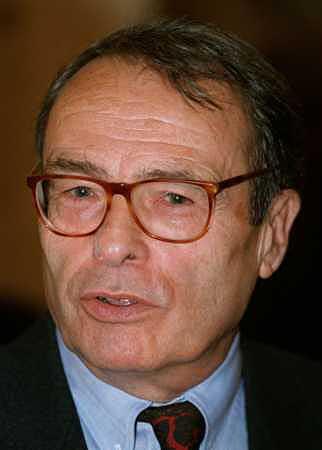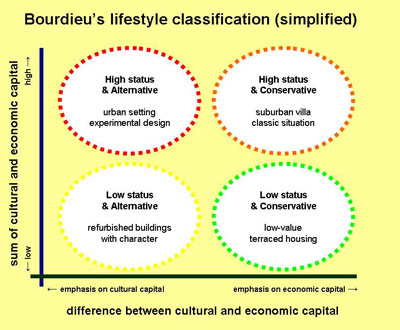
(http://firgoa.usc.es/drupal/images/9bbf8c78685c28029be852ea14979695-16983.jpg)
Pierre Bourdieu (see also, local copy)
Credits, references, and bibliography
(http://firgoa.usc.es/drupal/images/9bbf8c78685c28029be852ea14979695-16983.jpg)
Pierre Bourdieu
(see also,
local copy)
Bourdieu, An Introduction (http://www.youtube.com/watch?v=flz6shD3g2s)
Field theory - Pierre Bourdieu (http://youtu.be/7FXPnkwSCyE)
and another "simple explanation" http://youtu.be/87BPL62wyyU
Bridging Subjectivism and Objectivism (local copy)
Habitus (local copy: excerpt from Distinctions. A Social Critique of the Judgment of Taste. Conclusion. 1984, translated by Richard Nice, published by Harvard University Press, 1984, 604pp. – selected from pp. 466-484.)
Field
Contemporary Applications: The "Field" of American Higher Education Today (2, page 182)
Habitus and Field: Distinction (local copy: excerpt from Distinctions. A Social Critique of the Judgment of Taste. Conclusion. 1984, translated by Richard Nice, published by Harvard University Press, 1984, 604pp. – selected from pp. 466-484.) (http://www.youtube.com/watch?v=FBn28iNcpBA)

http://learningenvironment.reurba.org/images/BourdieuNew2.jpg (this site is no longer available)
(see, Mapping Class and Culture, and the Trajectory of Beer, too, for an interesting application)
Methodological relationism
Reflexive Sociology: study the habitus and practices of sociologists in the field of sociology, education and politics. Rather than objectifying the social world, study how sociologists attempt to achieve distinction. Issues of jargon, "science," and the role of sociological inquiry in maintaining power arrangement.
"A major alternative to structuration theory is Pierre Bourdieu's (1930-2002) theory of habitus and field. Bourdieu sought to bridge subjectivism (the individual) and objectivism (society) with a perspective called constructivist structuralism. Structuralism focuses on the objective structures of language and culture that give shape to human action. Constructivism looks at the social genesis of schemes of perception, thought, and action. Bourdieu wants to examine the social construction of objective structures with an emphasis on how people perceive and construct their own social world, but without neglecting how perception and construction is constrained by structures. An important dynamic in this relationship is the ability of individual actors to invent and improvise within the structure of their routines.
The habitus is the mental structure through which people deal with the social world. It can be thought of as a set of internalized schemas through which the world is perceived, understood, appreciated, and evaluated. A habitus is acquired as the result of the long-term occupation of a position in the social world. Depending on the position occupied, people will have a different habitus. The habitus operates as a structure, but people do not simply respond to it mechanically. When people change positions, their habitus is sometimes no longer appropriate, a condition called hysteresis. Bourdieu argues that the habitus both produces and is produced by the social world. People internalize external structures, and they externalize things they have internalized through practices.
The concept of field is the objective complement to the idea of habitus. A field is a network of social relations among the objective positions within it. It is not a set of interactions or intersubjective ties among individuals. The social world has a great variety of semi-autonomous fields such as art, religion, and higher education. The field is a type of competitive marketplace in which economic, cultural, social, and symbolic powers are used. The preeminent field is the field of politics, from which a hierarchy of power relationships serves to structure all other fields. To analyze a field, one must first understand its relationship to the political field. The next step is to map the objective positions within a field and, finally, the nature of the habitus of the agents who occupy particular positions can be understood. These agents act strategically depending on their habitus in order to enhance their capital. Bourdieu is particularly concerned with how powerful positions within a field can perpetrate symbolic violence on less powerful actors. Cultural mechanisms such as education impose a dominant perspective on the rest of the population in order to legitimate their power.
Bourdieu's analysis of the aesthetic preferences of different groups can be found in Distinction. The cultural preferences of the various groups within society constitute coherent systems that serve to unify those with similar tastes and differentiate them from others with divergent tastes. Through the practical application of preferences, people classify objects and in the process classify themselves. Bourdieu thinks the field of taste involves the intersection of social-class relationships and cultural relationships. He argues that taste is an opportunity to both experience and assert one's position in the class hierarchy. These tastes are engendered in the deep-rooted dispositions of the habitus. Changes in tastes result from struggles for dominance within both cultural and social-class fields as different factions struggle to define high culture and taste."(1)
Internet Exercise:(1)
Go to http://www.homme-moderne.org/societe/socio/wacquant/chronicUS.html, read the interview with Loic Wacquant, and answer the following questions.
a. How did Pierre Bourdieu win a large nonacademic audience?
b. Bourdieu is often compared to whom, in terms of his influence?
c. What was the subject of Bourdieu's earliest work?
d. Which element of Bourdieu's work "drew blood," according to the interviewer?
Weblinks:
http://www.slideshare.net/elma22/structures-and-the-habitus-pierre-bourdieu
http://pubs.socialistreviewindex.org.uk/isj87/wolfreys.htm
The Essence of Neo-Liberalism: http://mondediplo.com/1998/12/08Bourdieu (Bourdieu's critique of contemporary capitalism featured in Le Monde Diplomatique.)
Pierre Bourdieu Bibliography (at end of article): http://www.umsl.edu/~keelr/3210/resources/PIERREBOURDIEU-KEYTHINK-REV2006.pdf
Excerpts from Pierre Bourdieu's Distinction: http://www.marxists.org/reference/subject/philosophy/works/fr/bourdieu.htm
Social Capital Gateway: http://www.socialcapitalgateway.org/
Works Cited
1.
Much of this page comes from the "Instructor's Manual" to accompany Contemporary
Sociological Theory and Its Classical Roots: The Basics, Second Edition,
George Ritzer, Mcgraw-Hill, 2007. The Instructor's Manual was prepared by James
Murphy, University of Maryland, College Park and Todd Stillman, Fayetteville
State University. These excerpts are from chapter 7.
2. Ritzer, George. 2007/2010/2013. Contemporary Sociological Theory and Its Classical Roots: The Basics. 2nd/3rd/4th editions. St. Louis: McGraw-Hill
3. Calhoun, Craig (ed) Dictionary of the Social Sciences,
Article: Bourdieu, Pierre, Oxford University Press, 2002
![]()
Unless otherwise noted, all pages within the web site http://www.umsl.edu/~keelr/ ©2015 by
Robert O. Keel.
Click here to Report Copyright Problems